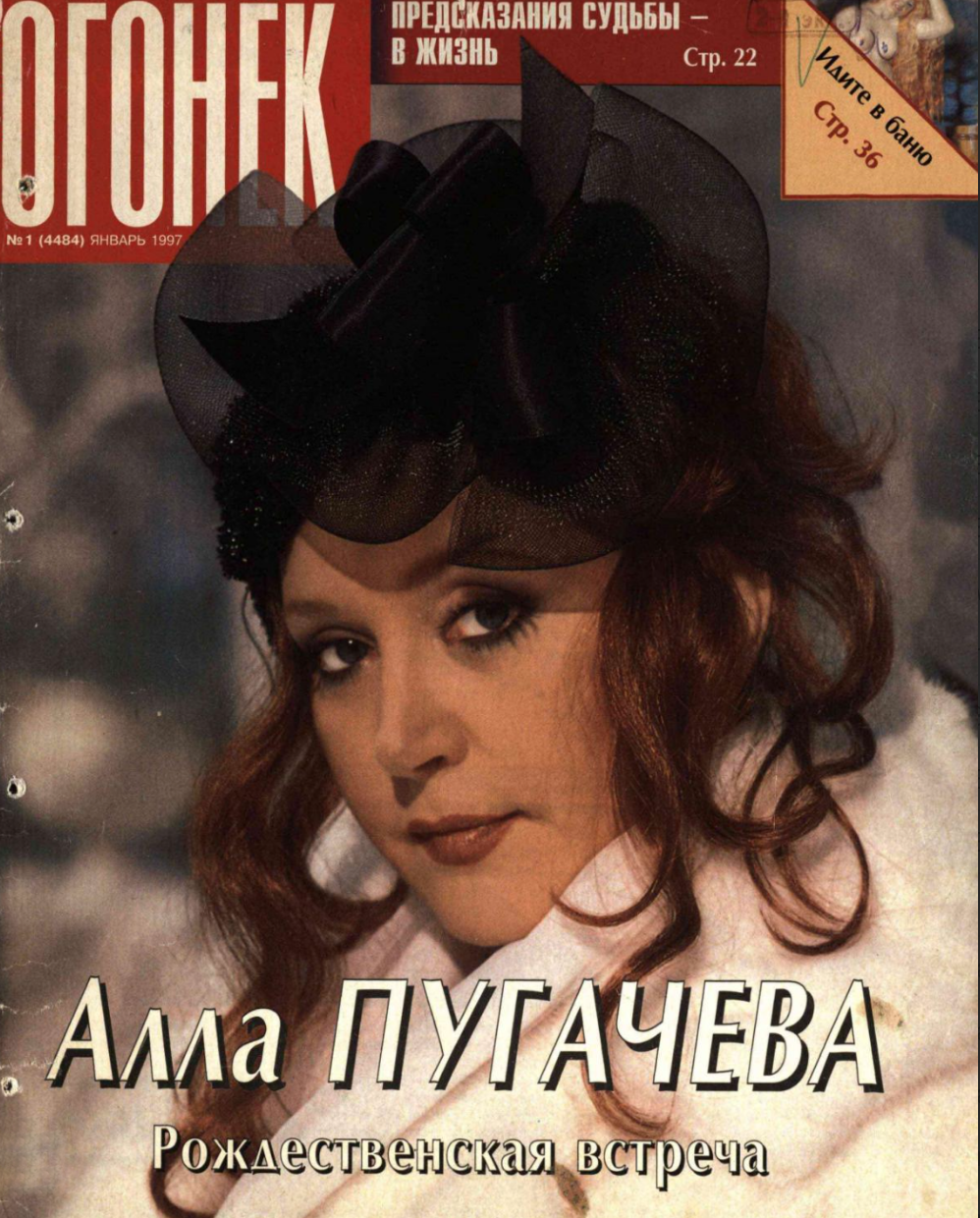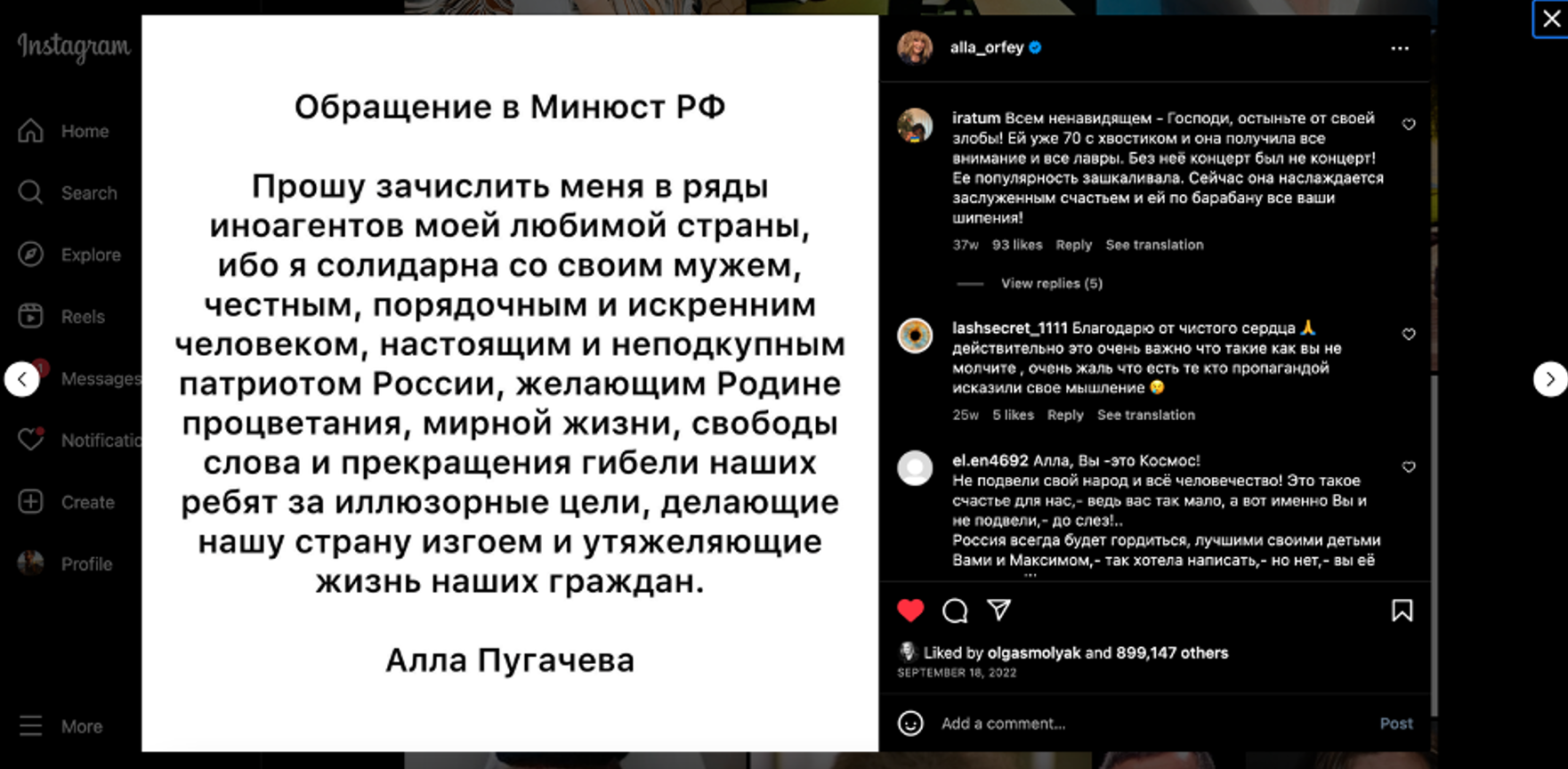Alla Pugacheva—Post-Soviet Diva
[2 items]
Among the wisest words attributed to late-Soviet leader Leonid Brezhnev (1906-1982) was this modest self-appraisal: “I will best be remembered as a minor politician in the era of Alla Pugacheva.” Assuming he made such a statement at all, he was right. Pugacheva (1949-) was the greatest pop star of her generation. The soundtrack to the 1977 film The Woman Who Sings (Zhenshchina, kotoraia poet, dir. Aleksandr Orlov), co-written and fully performed by Pugacheva, sold over 50 million copies in the Soviet Union that year. But Brezhnev was wrong about one thing: the era of Pugacheva far outlasted his own. The Soviet Union’s unchallenged queen of pop carried right on through four more General Secretaries, glasnost, and perestroika. On the eve of the Soviet Union’s fall, she was named the very last People’s Artist of the Soviet Union before the title disappeared forever. But Pugacheva was just getting started.
The post-Soviet 1990s were just as much hers as were the previous two decades. Statistically, she was post-Soviet Russia’s most important person. Public opinion polls conducted every year by VTsIOM asked respondents to rank the most important man and woman of each year. One name stands out through the post-Soviet decades: Alla Pugacheva. She monopolized the number one spot from 1994 to 1997 and did not leave the top three for the entire decade. No one else—man or woman—came close to this kind of dominance. 1994 was perhaps the height of her fame. Her romance, engagement, and then marriage to the up-and-coming pop star Filipp Kirkorov (1967-) occupied headlines for the better part of that year.
The courtship played out in hit songs (Pugacheva’s “Love that Feels Like a Dream [Liubov’, pokhozhaia na son],” and Kirkorov’s “My Bunny [Zaika moia]”). The couple’s engagement party closed down Tverskaya Street in Moscow, and, when the marriage was registered at the St. Petersburg Department of Public Services or ZAGS, Mayor Anatoly Sobchak (1937-2000) was in attendance. But that was not all. Two months later, the newlyweds flew to Jerusalem for a traditional Russian Orthodox ceremony. It was Pugacheva’s fourth marriage, and one that would last more than a decade.
But it was also the moment when Pugacheva made her private life into an ongoing spectacle, with trademark élan. Savvy enough to maintain her prominence through several Soviet administrations, the star now proved herself nimble enough not only to survive, but to thrive in the new capitalist attention economy. The cover featured above, from the January 1997 issue of Ogonek, details her transformation into a post-Soviet celebrity. That year, she went on to represent Russia in the Eurovision song competition, taking 15th place with “Primadonna,” and later won several state awards from the new Russian Federation, including the Order “For Merit to the Fatherland” bestowed by Vladimir Putin in 2014.
In 2022, her next husband, the satirist Maksim Galkin (1976-), was labeled a “foreign agent” for publicly opposing Russia’s invasion of Ukraine. Pugacheva took to social media to request the same status for herself (see the second image in the carousel above), writing: “To the Ministry of Justice of the Russian Federation: I ask to be counted among the ranks of foreign agents of my beloved country, for I am in solidarity with my husband, an honest, upright, and sincere person, a true and incorruptible patriot of Russia who wishes his Motherland a flourishing, peaceful existence, freedom of speech, and an end to the killing of our boys for an illusory goal that has made our country a pariah and has made life more difficult for our citizens. Alla Pugacheva”
Pugacheva, now permanently relocated to Israel, has cemented her status as a figure who not only transcended some of the world’s messiest politics for decades, but who, when the moment required it, used her enormous fame to oppose the worst excesses of the government—and the country—that had given her so much.
The post-Soviet 1990s were just as much hers as were the previous two decades. Statistically, she was post-Soviet Russia’s most important person. Public opinion polls conducted every year by VTsIOM asked respondents to rank the most important man and woman of each year. One name stands out through the post-Soviet decades: Alla Pugacheva. She monopolized the number one spot from 1994 to 1997 and did not leave the top three for the entire decade. No one else—man or woman—came close to this kind of dominance. 1994 was perhaps the height of her fame. Her romance, engagement, and then marriage to the up-and-coming pop star Filipp Kirkorov (1967-) occupied headlines for the better part of that year.
The courtship played out in hit songs (Pugacheva’s “Love that Feels Like a Dream [Liubov’, pokhozhaia na son],” and Kirkorov’s “My Bunny [Zaika moia]”). The couple’s engagement party closed down Tverskaya Street in Moscow, and, when the marriage was registered at the St. Petersburg Department of Public Services or ZAGS, Mayor Anatoly Sobchak (1937-2000) was in attendance. But that was not all. Two months later, the newlyweds flew to Jerusalem for a traditional Russian Orthodox ceremony. It was Pugacheva’s fourth marriage, and one that would last more than a decade.
But it was also the moment when Pugacheva made her private life into an ongoing spectacle, with trademark élan. Savvy enough to maintain her prominence through several Soviet administrations, the star now proved herself nimble enough not only to survive, but to thrive in the new capitalist attention economy. The cover featured above, from the January 1997 issue of Ogonek, details her transformation into a post-Soviet celebrity. That year, she went on to represent Russia in the Eurovision song competition, taking 15th place with “Primadonna,” and later won several state awards from the new Russian Federation, including the Order “For Merit to the Fatherland” bestowed by Vladimir Putin in 2014.
In 2022, her next husband, the satirist Maksim Galkin (1976-), was labeled a “foreign agent” for publicly opposing Russia’s invasion of Ukraine. Pugacheva took to social media to request the same status for herself (see the second image in the carousel above), writing: “To the Ministry of Justice of the Russian Federation: I ask to be counted among the ranks of foreign agents of my beloved country, for I am in solidarity with my husband, an honest, upright, and sincere person, a true and incorruptible patriot of Russia who wishes his Motherland a flourishing, peaceful existence, freedom of speech, and an end to the killing of our boys for an illusory goal that has made our country a pariah and has made life more difficult for our citizens. Alla Pugacheva”
Pugacheva, now permanently relocated to Israel, has cemented her status as a figure who not only transcended some of the world’s messiest politics for decades, but who, when the moment required it, used her enormous fame to oppose the worst excesses of the government—and the country—that had given her so much.

